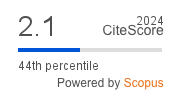Merging Minds and Machines: The Role of Advancing AI in Robotics
DOI:
https://doi.org/10.4108/eetiot.4658Keywords:
artificial intelligence, robotic system, cognitive augmentation, Human-Robot collaboration, Autonomous Intelligence, Visual perception, speech recognitionAbstract
The relentless pursuit of creating intelligent robotic systems has led to a symbiotic relationship between human inventiveness and artificial intelligence (AI). Artificial intelligence is a theory. It is the development of computer systems that are able to perform tasks that would require human intelligence. This abstract explores the pivotal role that AI plays in advancing the capabilities and applications of robotic systems. The integration of AI algorithms and machine learning techniques has launched robotics beyond mere automation, enabling machines to modify, alter, adjust, learn, and interact with the world in ways previously deemed science fiction. Design fictions that vividly imagines future scenarios of AI or robotics in use offer a means both to explain and query the technological possibilities. Examples of these tasks are visual perception, speech recognition, decision-making, and translation between languages. The three key dimensions of AI’s role in robotics are Cognitive Augmentation, Human-Robot Collaboration, and Autonomous Intelligence. The abstract also discusses the societal implications of this AI-driven advancement in robotic systems, including ethical considerations, job market impacts, and the democratization of access to advanced technology. The convergence of human intellect and artificial intelligence in robotics marks a transformative era where machines become not just tools, but companions, collaborators, and cognitive extensions of human capabilities. Researchers are taking inspiration from the brain and considering alternative architectures in which networks of artificial neurons and synapses process information with high speed and adaptive learning capabilities in an energy-efficient, scalable manner. The indispensable role of AI in shaping the future of robotic systems and bridging the gap between human potential and machine capabilities is highlighted. The major impact of this synergy reverberates across industries, promising the world where robots become not just mechanical contraptions / defective apparatus but intelligent partners in our journey of progress.
Downloads
References
Janmanchi Harika, Palavadi Baleeshwar, Kummari Navya, Hariharan Shanmughasundaram.A Review on Artificial Intelligence with Deep Human Reasoning. in proceedings of 2022 International Conference of Applied Artificial Intelligence and Computing (ICAAIC), Salem, India, (2022).
Pavel Hamet, Johanne Tremblay.:Artificial intelligence in medicine. Metabolism, Supplement, (2017).
O'Neill, Brian, Gillespie, Alex.: Simulating naturalistic instruction: the case for a voice mediated interface for assistive technology for cognition. Journal of assistive technologies; 2008. 2 (2). pp. 22-31
Arash Ajoudani, Andrea Maria Zanchettin, Serena Ivaldi, Alin Albu-Schäffer, Kazuhiro Kosuge, et al.: Progress and Prospects of the Human-Robot Collaboration; (2017) Autonomous Robots, pp.1-17.
Yingxu Wang, Ming Hou, Konstantinos N. Plataniotis, Sam Kwong, Henry Leung, Edward Tunstel, Imre J. Rudas, Ljiljana Trajkovi.: Towards a Theoretical Framework of Autonomous Systems Underpinned by Intelligence and Systems Sciences. IEEE/CAA JOURNAL OF AUTOMATICA SINICA, (2021)..
Yuanlong Yu, Jason Gu, George K. I. Mann,Raymond G. Gosine.: Development and Evaluation of Object Based Visual Attention for Automatic Perception of Robots. IEEE TRANSACTIONS ON AUTOMATION SCIENCE AND ENGINEERING, (2013).
Santosh K. Gaikwad, Bharti W. Gawali, Pravin Yannawar.: A Review on Speech Recognition Technique. International Journal of Computer Applications (0975 - 8887), (2010).
Pedro G. Espejo, Sebastian Ventura, Francisco HerreraA.: Survey on the Application of Genetic Programming to Classificatio. IEEE TRANSACTIONS ON SYSTEMS, MAN, AND CYBERNETICS—PART C: APPLICATIONS AND REVIEWS, (2010).
Haitham M. Alzoubi. Muhammad Alshurideh, Taher M. Ghazal.: Integrating BLE Beacon Technology with Intelligent Information Systems IIS for Operations' Performance: A Managerial Perspective. The International Conference on Artificial Intelligence and Computer Vision AICV 2021: Proceedings of the International Conference on Artificial Intelligence and Computer Vision (AICV2021) pp 527-538 (2021).
David Pierce, Benjamin J. Kuipers.: Map learning with uninterpreted sensors and effectors. Artificial intelligence, (2019).
Downloads
Published
Issue
Section
License
Copyright (c) 2023 EAI Endorsed Transactions on Internet of Things

This work is licensed under a Creative Commons Attribution 3.0 Unported License.
This is an open-access article distributed under the terms of the Creative Commons Attribution CC BY 4.0 license, which permits unlimited use, distribution, and reproduction in any medium so long as the original work is properly cited.




